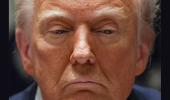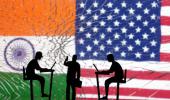
IMAGE: A large container vessel arrive at New Mangalore Port. Photograph: ANI Photo
Industry associations and companies in the United States, including the US Chamber of Commerce (USCC), Coalition of Services Industries (CSI), and the iconic bike company Harley Davidson have called on the Donald Trump dispensation to push India to reduce tariffs, non-tariffs, and regulatory barriers to boost American exports.
Their appeal comes as part of the review of unfair trade practices by partner countries launched by the US Trade Representative (USTR) ahead of the announcement of reciprocal tariffs on April 2.
The USCC, the largest business lobbying group in the US, asked for reduced import duties by India on pharmaceuticals to 'enhance access to affordable medicines for Indian consumers but also promote greater trade and investment in the healthcare sector'.
The chamber has also called for a potential trade agreement to include provisions to allow for 'dual-location of pharmaceutical manufacturing' that could strengthen the global supply chain.
It highlighted price controls on patented medicines and medical devices like stents and knee implants under the National List of Essential Medicines and trade margin rationalisation policies deterring pharmaceutical investments as well as the menace of counterfeit drugs in India.
It wants India to allow the import of refurbished/reused medical equipment including CT scanners and other advanced surgical systems.
The USCC also called for reducing the 28 per cent Goods and Services Tax (GST) on non-alcoholic aerated beverages under the classification of sin/demerit goods that adversely impact the profitability of American companies.
Among other issues, USCC highlighted strict local content requirements in India asking for competitive neutrality' in key sectors and urging both governments to sign a public procurement agreement that allows mutual access to each other's public sector.
As part of any trade deal, India should commit to liberalise additional SOE (State-owned enterprises) segments...'
Harley Davidson, the iconic American bike company often cited by US President Donald Trump, raked in high tariffs it faces in India.
'While the US grants key trading partners like the European Union, Brazil, Thailand, and India imports of motorcycles with duties ranging from 0 per cent to just 2.4 per cent, there is a significant imbalance where US-made motorcycles must pay 6-8 per cent duty rate in the EU, 18 per cent in Brazil, 60 per cent in Thailand, and a 100 per cent in India.'
The Coalition of Services Industries (CSI) whose members include Google, Amazon, Mastercard, in its submission said US companies in all industries face mounting trade and investment barriers in India.
'The raft of digital protectionist policies imposed, or under consideration, by the Indian government remains concerning to the US services sectors,' CSI said.
CSI highlighted issues like the local content requirement, and unfair advantage given to Unified Payments Interface (UPI) and Rupay cards, data localisation, mandatory testing and certification of telecom equipment, differential tax treatment of foreign companies, Customs duties on information technology products, among others.
The independent e-commerce retailer and sellers in their submission said India and China impose high duties on e-commerce imports and strictly regulate incoming goods through customs controls, prohibiting exports by small retailers from the US.
'For instance, India levies import duties ranging from 42 per cent to 60 per cent on e-commerce goods and has banned certain categories like toys.
'To ensure a level playing field, e-commerce imports from China and India should be subject to reciprocal duties and quality controls,' it added.
While India is expecting to benefit from greater market access in apparels by signing a trade deal with the US, the American Apparel & Footwear Association has complained that India is making it as difficult and costly as possible to make footwear for the Indian market outside of India.
'Recent Quality Control Orders (QCOs) that India's BIS have implemented required certification of each factory (there is a backlog), testing, audits, and each pair must be stamped with a BIS-certified logo.
'These protectionist regulations are forcing US companies to exit the market,' it said.
The US agriculture commodity associations for items like milk, rice, wheat, soybean, corn, almond, walnuts, pistachio, blueberry, cherry, and table grape raised the issue of high domestic subsidy and significant trade barriers they face in India.
The International Dairy Foods Association (IDFA) said India represents a tremendous potential for US dairy exports, which are limited through a combination of non-tariff barriers and exorbitant tariffs.
'Given that US dairy exports to India reached $52 million in 2024 just in the limited dairy products permitted to enter, IDFA believes the India market potential if restrictions were lifted is at least twice that amount due to significant demand in India for lactose, casein, and whey protein concentrates and isolates, which have historically been restricted,' it added.
The US Wheat Associates highlighted the 'high levels of domestic support' for wheat production and trade distorting high tariffs to discourage imports by the Indian government.
'Compliance on trade distorting domestic subsidy spending would send better market signals and increase economic returns to US producers (by $792 million by 2031/32).'
The Illinois Corn Growers Association (ICGA) highlighted India's import prohibition of genetically modified corn and ethanol for fuel despite ambitious biofuel utilisation goals.
'If US corn were able to access just 15 per cent of Indian corn imports in marketing year 2023/2024, farmers would have received about $22 million.
'If the government of India allowed the import of US ethanol for fuel use and we achieved just 5 per cent market share, those exports would be worth $237 million annually,' it added.
The American Soybean Association said India continues to be a difficult market for US soy exports as it uses 'significant tariff and non-tariff barriers' to favour domestic production over imports.
'The US has actively sought bilateral and multilateral opportunities to increase market access, so far without yielding improvements.
'Soybeans and soybean products face tariffs from 15 to 45 per cent,' it said.
The Almond Alliance representing the farmers of the largest agri commodity exports to India said reduction of import duty for inshell and kernel almonds by India would place the US in a more competitive position to Australia which has a trade agreement with New Delhi providing it a 50 per cent duty advantage.
The North American Blueberry Council (NABC) highlighted that fresh and frozen blueberries face a 10 per cent tariff, while the processed blueberries are subject to tariffs ranging from 10 to 50 per cent in India.
"India's tariffs are unwarranted and constrain US blueberries exports.
'NABC urges USTR to pursue the elimination of India's tariffs on US fresh, frozen, and processed blueberries through any available opportunity.'
The California Cherry Board (CCB) said while India is a potential growth market, exports are constrained by India's high 30 per cent tariff on imports of fresh cherries.
'This high tariff is unjustified, especially considering California cherries do not compete with any Indian cherry production.
'To facilitate the growth of US cherry exports to India, the CCB seeks the elimination of India's tariff on imports of sweet cherries through any available opportunity.
'The CCB would support a US-India trade agreement that achieved this objective.'
The California Table Grape Commission said the US fresh grapes lose out to competitors from Australia and Chile as the latter entered the Indian market at reduced import duties under respective trade agreements.
'The commission asks USTR to seek the elimination of India's high 30 per cent tariff on US fresh through any available opportunity and to pursue reforms to India's import and taxation system to reduce the burdens on trade,' it said.
Greater call for access
Feature Presentation: Ashish Narsale/Rediff.com












 © 2025
© 2025